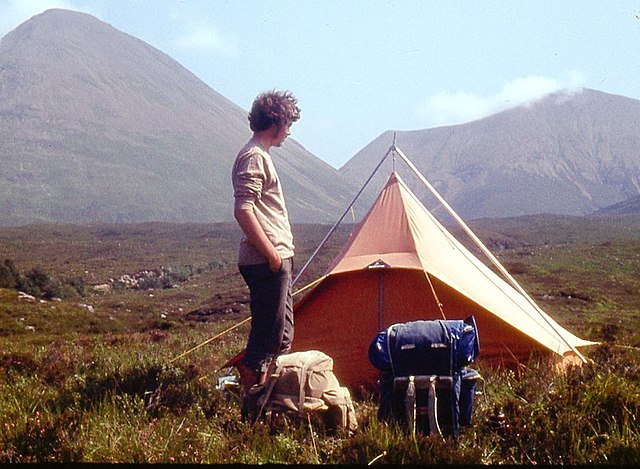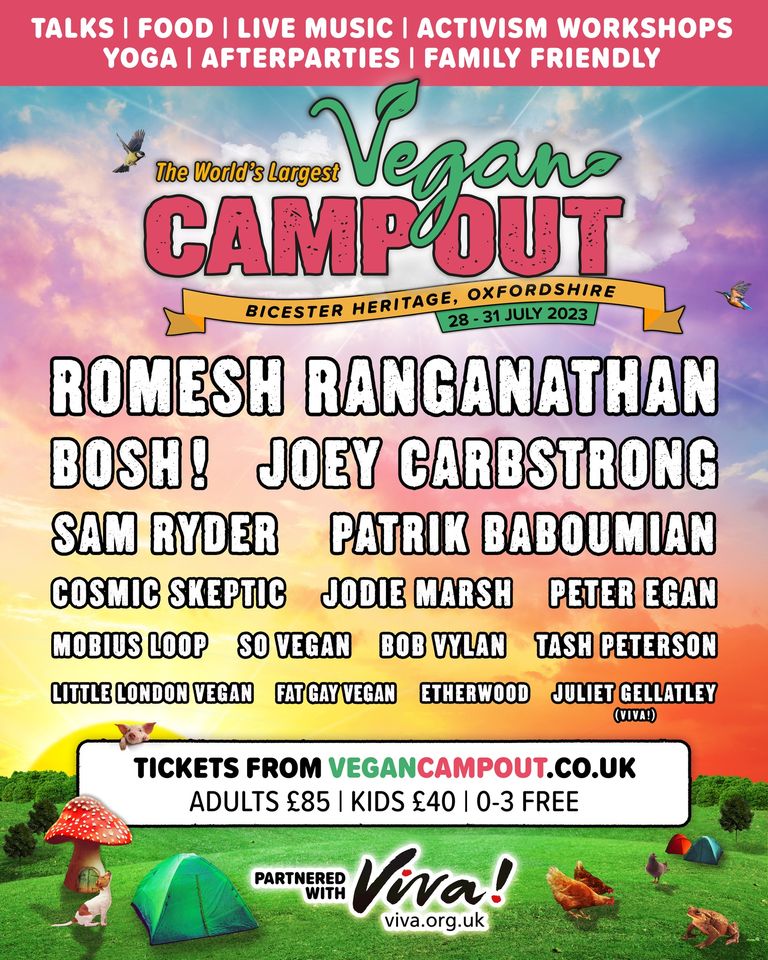
Photo credit: Wikimedia Commons
Vegan Camp Out is a British vegan festival held every uly that gathers thousands of attendees for a weekend of vegan talks, activities, and socialising. With tickets starting at £85 pounds, Vegan Camp Out is hardly an accessible event. Folks who rely on mobility devices would also find the campground difficult to access. Women, too, it seems are having issues with accessibility. Year after year, “the world’s largest vegan camping festival” features a nearly all-male lineup.
In 2023, Vegan Camp Out highlights 20 speakers and performers on its promotional flyer. Only 6 of them appear to present as women.
In 2022, it highlighted Earthling Ed, Evanna Lynch, Simon Amstell, Lucy Watson, JME, Gaz Oakley, Bimini Bon-Boulash “and many others.”
In 2021, it celebrated its “incredible line-up” of Russell Brand, BOSH!, Chris Packham, Joey Carbstrong, Benjamin Zephaniah, P Money, Cosmic Skeptic “and more!”
In 2019, it cheered its “impressive line-up” of Earthling Ed, Matt Pritchard, Shikari Sound System, Akala “and many more.”
In 2018, it touted its “fantastic line-up” consisting of Simon Amstell, JME, Macka B, Neal Barnard, Melanie Joy, Heather Mills “and many more!”
The above highlights pulled from the Vegan Camp Out “Previous Years” website (as of April 23, 2023) include 28 speakers and artists. Only four of them present as women (in addition to Bon Boulash who is openly non-binary). The other female speakers, we are left to assume, must be counted among the “many more.”
The fantasy that Vegan Camp Out nurtures, whether intentionally or not, is a vegan movement by men for men. Too often in social movements, women are not deemed worthy of political thought or organizational contribution beyond making coffee and copies or serving as groupies. In the animal rights movement, which is comprised of a female majority (approximately 4 out of 5 vegan activists are women), the invisibilization of women exemplifies institutionalized sexism. It misrepresents, devalues, and erases women’s contributions while platforming men as more interesting, intelligent, and appropriate for leadership.
When challenged on this misrepresentation, Vegan Camp Out responded to me via Facebook on April 20, 2023, noting that their mostly male approach is acceptable because “the number of high profile acts/activists is [not] always proportionate” and “we book our line-up by listening to who our audience wants us to see, rather than us specifically.”
It is a Catch-22. Vegan Camp Out defers to audience polls to determine who will be approached as a speaker. Yet, with perpetual all-male lineups across the animal rights movement, how could the average activist be expected to know of any speakers who are not male? Women aren’t granted platform and this, in turn, ensures they will not be granted platform into perpetuity.
For that matter, the reality is that our society is sexist and male-favoring. Women, too, are socialized by patriarchy. The point is that movement leaders like Vegan Camp Out are in an important and influential position to develop the movement rather than replicate its weaknesses. Rather than recognize this responsibility, leaders too often dismiss anti-sexist critiques with gaslighting.
Vegan Camp Out furthers:
We don’t just book other people that our audience aren’t interested in seeing just to increase the number for that demographic, as we don’t book people based on their race or gender as that would be discriminatory and something we don’t agree with.
Vegan Camp Out bills itself as “The UK’s Best Vegan Festival.” This means it is in a unique position of professional obligation. When feminists and anti-racism activists raise attention to inequality and demand intervention, a common liberal response is to charge them with “reverse sexism” and “reverse racism.” This kind of response is an effective means to resist meaningful diversity efforts and maintain systems of inequality. It is effectively anti-affirmative action to the effect of maintaining white male supremacy. As a social movement, we have a duty to challenge inequality, not make excuses for it. Particularly for community leaders like Vegan Camp Out, it is vital that platforms are used to promote the world we want to see rather than replicate inequality and marginalization.
The vegan feminist community calls on organizations and individuals to do better. Organizations should actively ensure a diversity of contributors (and accessibility for a diverse audience). Men should boycott events that do not have some semblance of diversity in representation. Everyone can nominate more women, trans women and men, non-binary people, people of color, people with disabilities, and other folks from marginalized groups who, despite their marginalization, have important things to say. Everyone can read more of their work, reference them more, and make space for their ideas and experiences that might differ from the middle-class white male Western experience.
This is not just a matter of equality for our movement, but it is of vital importance for creating a robust and effective movement. Western white men created many of these problems, we should hesitate in deferring to Western white men to fix them. Their expertise should be integrated into a multifaceted repertoire of tactical knowledge and theories of change, not rise to the top of that repertoire and crowd out the rest. This is not a matter of divisiveness; it is a matter of consistency in the anti-oppression work we engage in anti-speciesist spaces. To achieve total liberation for all species, vegan activists must also examine their own participation in inequality. If we, as a movement, cannot take seriously gender discrimination, this renders dubious our challenge to species discrimination. Why? Because oppressions share similar roots and mechanisms; sexism and speciesism are intimately entangled.
Contact Vegan Camp Out and ask that they step up as movement leaders and ensure a more diverse program:
Twitter: @VeganCampOut
Facebook: @VeganCampOut
Instagram: @VeganCampOut
Read more about this issue in my 2017 essay, “Uh Oh… Your Vegan Panel is All White or Male.”
Learn more about challenging vegan sexism from our “Tips for Male Allies“
Dr. Wrenn is Lecturer in Sociology at the University of Kent. She received her Ph.D. in Sociology with Colorado State University in 2016. She was awarded Exemplary Diversity Scholar, 2016 by the University of Michigan’s National Center for Institutional Diversity. She served as council member with the American Sociological Association’s Animals & Society section (2013-2016) and was elected Chair in 2018. She is the co-founder of the International Association of Vegan Sociologists. She serves as Book Review Editor to Society & Animals and is a member of the Research Advisory Council of The Vegan Society. She has contributed to the Human-Animal Studies Images and Cinema blogs for the Animals and Society Institute and has been published in several peer-reviewed academic journals including the Journal of Gender Studies, Environmental Values, Feminist Media Studies, Disability & Society, Food, Culture & Society, and Society & Animals. In July 2013, she founded the Vegan Feminist Network, an academic-activist project engaging intersectional social justice praxis.
She is the author of A Rational Approach to Animal Rights: Extensions in Abolitionist Theory (Palgrave MacMillan 2016), Piecemeal Protest: Animal Rights in the Age of Nonprofits (University of Michigan Press 2019), and Animals in Irish Society: Interspecies Oppression and Vegan Liberation in Britain’s First Colony (State University of New York Press 2021).
Receive research updates straight to your inbox by subscribing to my newsletter.


